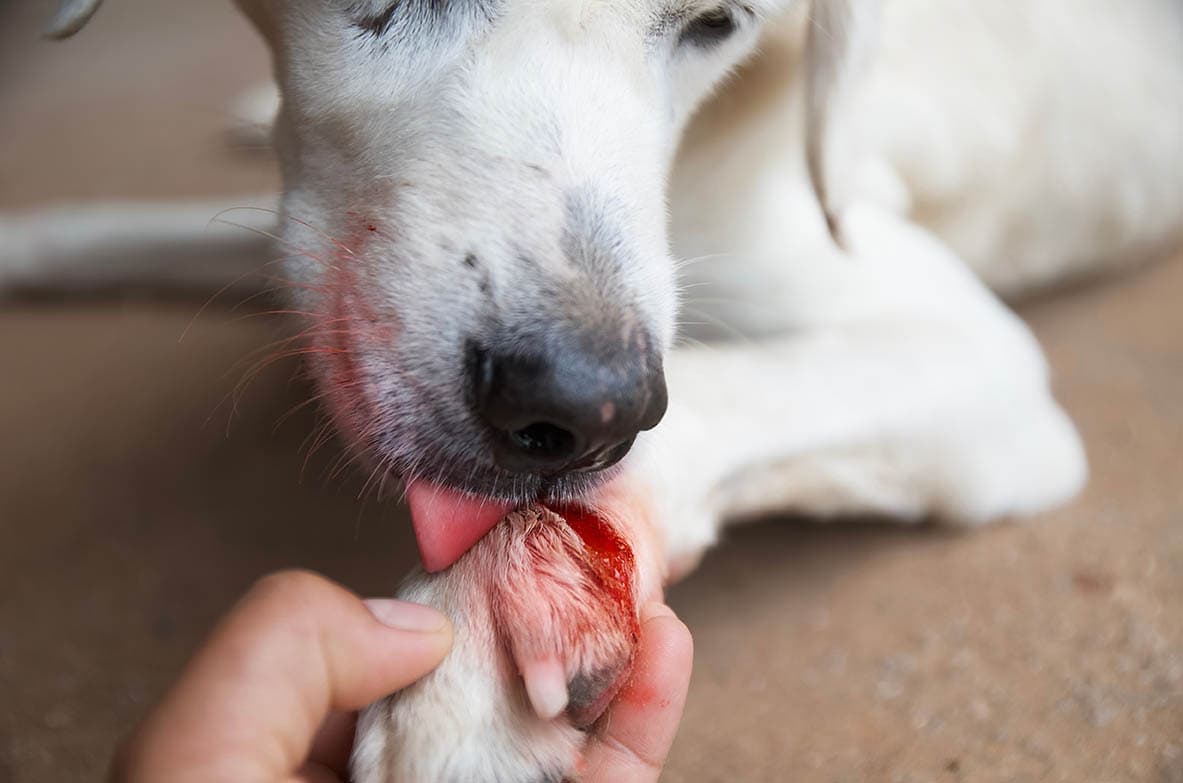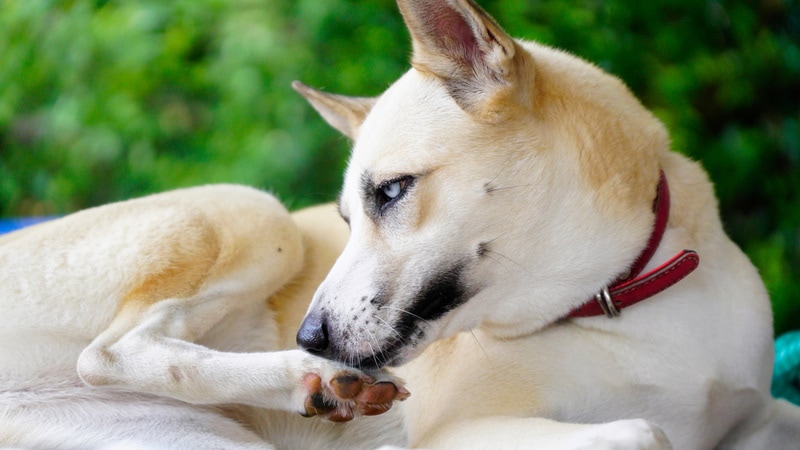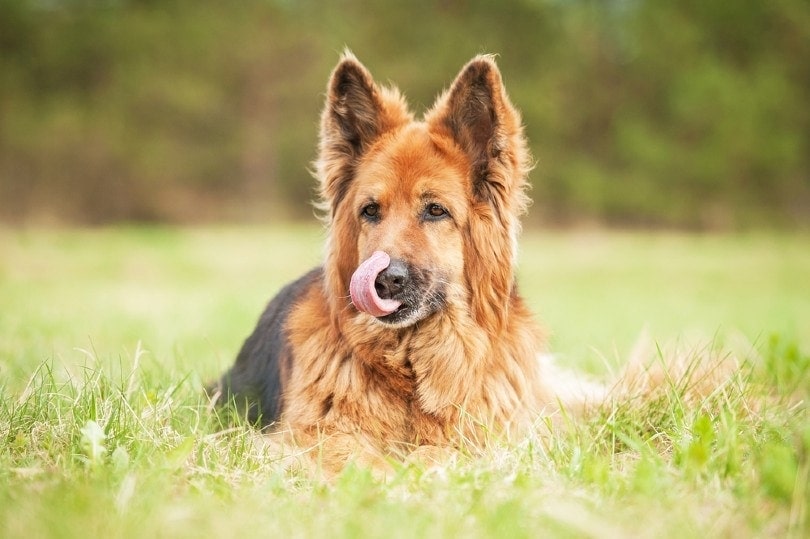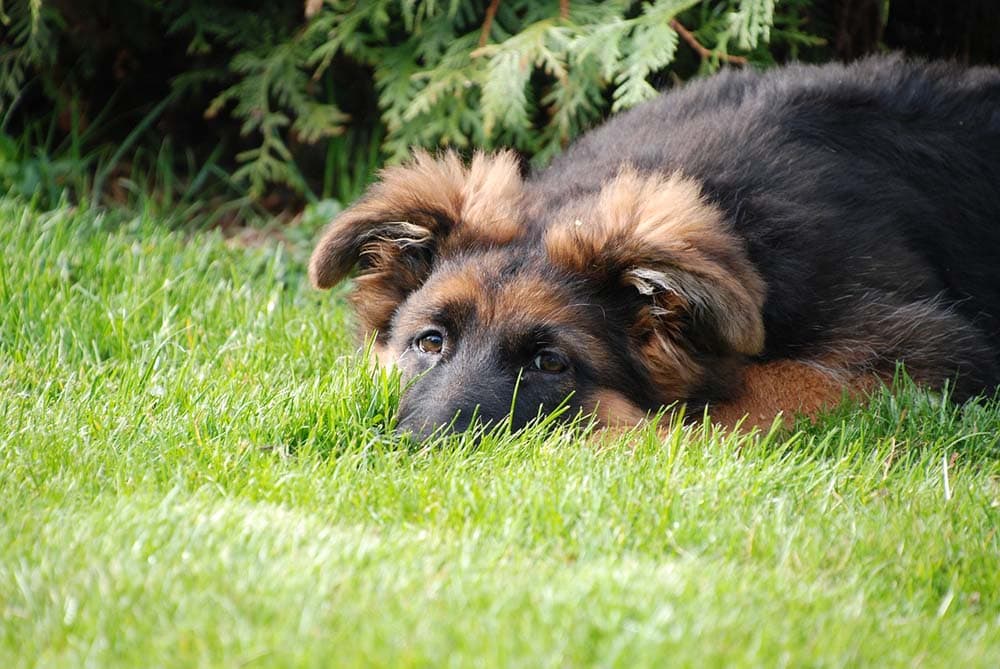Why Do Dogs Lick Blood? Vet-Reviewed Facts & FAQ

Updated on

Whether it’s our blood or their own, there’s something about dogs licking up blood that can make your stomach feel a bit squirmy. Although it seems strange, licking is an instinctual action that all canines exhibit to varying degrees. If you see your dog licking a wound, you should prevent them from doing so, as it will more often than not lead to further inflammation and even infection, as they don’t know how to do it in moderation.
Why Do Dogs Lick Their Own Blood?
When a dog has a wound or is bleeding, the first thing they’ll probably do is lick it. Licking is an instinctual behavior for dogs that allows them to explore their environment. A dog using their tongue can be compared to us using our hands to explore our surroundings or our wounds or sores.
Licking their wounds, contrary to popular belief, is not necessarily a good way to clean them or reduce the healing time. Dog’s saliva contains more than 600 different types of bacteria, and as all dog owners know, their pooches will often lick their private areas or other non-hygienic contents.1 Unlike wolves and wild dogs that lead very active lives, our pet dogs spend a lot of time resting and will often lick their wounds excessively due to boredom. This can actually cause a significant delay in the wound healing and lead to further inflammation, bacterial infection, and wound reopening.
When a dog is licking either an object, themselves, their wound, or their owners, the act itself releases endorphins, which provide a degree of relief from stress and anxiety.2
Some may argue there is also a practical reason that goes back to when dogs lived in the wild. Blood attracts other predators, and wild dogs might ingest it to avoid this unnecessary attention, but scientific evidence to support this claim is lacking.

Why Do Dogs Lick Human Blood and Wounds?
It’s instinctive for many animals to explore their wounds—primates, dogs, cats, and even rodents will groom themselves and may tend to their wounds by licking them. After all, dogs use their tongues to explore their surroundings and their bodies. People will instead use their hands and often rub a sore spot. The nerves used to transmit the rubbing sensation reduces the feeling of pain or soreness.3
Dogs have a much stronger sense of smell than humans with 50 times more olfactory receptors and usually rely on it more than actual taste. They are able to smell our wounds and will instinctually be interested in licking them as a way of exploring. Smelling and tasting blood resembles the smell of meat and animal protein sources, used in dog food, which makes this more interesting to your pooch.
Does a Dog’s Saliva Heal Wounds?
The belief that dogs can heal a human’s wounds by licking them is deeply rooted in ancient Egypt. However, your dog’s saliva, although it may have some very limiting and insignificant antibacterial properties based on outdated research, is more likely to be harmful if it enters your bloodstream. Several bacteria in a dog’s mouth can cause infections. For example, Pasteurella can cause an infection so severe that it can be life-threatening in some cases.
How Do You Discourage Your Dog From Licking Blood?
There are a few ways to discourage your dog from licking up blood, and how you do that will depend on where the blood has come from.
1. Their Blood
Some dogs will lick the blood off their wounds and move on. However, most will actually compulsively lick their wounds and make the injury worse by introducing more bacteria, thus leading to a moist environment, reopening the wound, and delaying healing.
An Elizabethan or inflatable collar, depending on the location and size of the wound, will prevent your dog from reaching where they want to lick, and your vet may cover the injury with a bandage to protect it if necessary. All wounds require veterinary attention before they get worse while bleeding ones are urgent.

2. Human Blood
The best thing to do is clean up your blood as soon as you’re hurt. If your dog gets to you first, move away and ignore them. If the wound is substantial, they might be able to smell the blood through your plaster or bandage. If they don’t leave you alone, redirect their attention. Give them something to chew or a toy.
3. Blood on the Ground
If your dog discovers blood on the ground while out for a walk, the easiest thing to do is lead them away and distract them with a treat or a game of fetch away from the crime scene.
Final Thoughts
When dogs lick blood, they are simply using their tongues to explore their bodies or their surroundings, relying on finding the source of it by smelling it before tasting it. However, you should not allow your pet to lick your cuts or their own wounds. Bacteria from the dog’s saliva can cause severe infections and delay healing, but thankfully, there are ways you can distract them and redirect their attention.
Featured Image Credit: lovelyday12, Shutterstock













